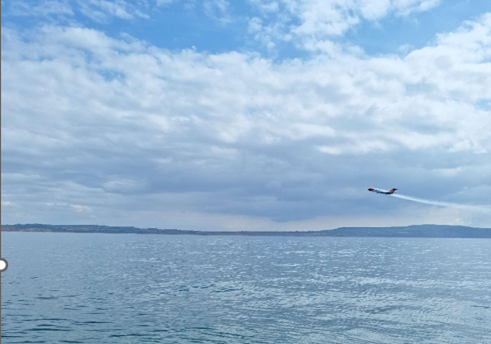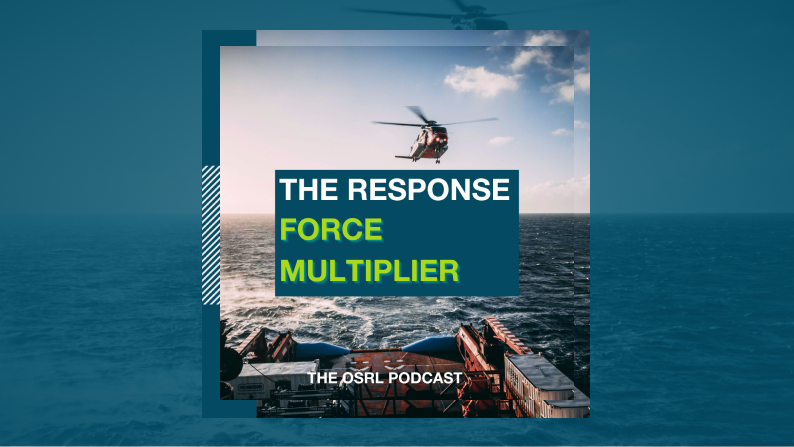Case Study: Tullow Ghana conduct exercise with OSRL support
As part of Tullow Ghana Limited’s (TGL) continued commitment towards oil spill and emergency response preparedness, an annual exercise was conducted over a four day period in November 2015. The exercise was designed to test all functions of the TGL Incident Management System (IMS) led by the Crisis Management Team (CMT) based in London through to the Logistical Support Team in Takoradi, Ghana.
Exercise Activities
Day One - Offshore Response
The first stage of the exercise concentrated on an offshore response led by the TGL Incident Management Team (IMT) in Accra. The exercise tested TGL’s Emergency and Incident Response Plans, equipment readiness and the Field Response Team’s capability toward a standalone deployment.
Oil Spill Response Limited’s (OSRL) Duty Manager supported the exercise in a live role liaising with the IMT to provide assistance and guidance as required. To support the practical element of the exercise, the OSRL WACAF service (West and Central Africa) aircraft was brought in to simulate aerial dispersant application. This was also the case in 2014 during Exercise Oscar, when it was considered the use of the WACAF service was proven to be an excellent showcase of capability.
After initial notification was received from the TGL Duty Incident Manager (DIM), the first action was to deploy a spill tracker buoy from the EHSS vessel, Seacor Master. Data from the tracking buoy via web link was then monitored by both the Takoradi Logistic Support Team and the IMT, enabling them to anticipate trajectory and deploy a containment system in the most effective position. M/V Pacific Pelican, on receiving instruction from the On Scene Commander, deployed 200 metres of Ro-boom, 1500 metres under tow of the Seacor Master manoeuvring into a J-formation NNE of the spill source. A Helix Skimmer and product transfer system was also made ready for deployment.
The WACAF aircraft arrived in-field completing aerial surveillance initially before moving into a location adjacent to the response vessels to conduct simulated dispersant spray runs; 4 of which were completed in total. This concluded the practical deployment for day one, whereupon the WACAF aircraft returned to Takoradi to complete a debrief with TGL Aviation Department. A daily debrief with all personnel from the Logistical Support Team was also completed which highlighted lessons learnt that day and the ongoing logistical support that would be required going into day two. Day one of the exercise was then brought to a close.
Day Two - Shoreline Response
Day two’s exercise scenario was oriented around pre-impact preparation and mobilisation of shoreline equipment that would be utilised to protect numerous sites of sensitivity along Ghana’s western coastline.
Trajectory modelling dictated that several sites to the west of Takoradi would be impacted within a 24 hour timeframe; with this in mind two areas were chosen for the exercise. These were Casa Blanca Beach Resort; a site that includes a shallow foreshore where sea enters a lagoon, and Ngesiah Village; a local fishing community.
TGL’s Field Response Team (FRT) mobilised to Casa Blanca Beach Resort with a shoreline package that included an Utility Task Vehicle (UTV) to support the transfer of equipment from the lay down area to the beach location. A primary and secondary boom arrangement was deployed to protect the lagoons inherent high sensitivity. The FRT then set-up a shallow water skimmer and a collapsible storage tank to simulate recovery operations.
An OSRL secondee to TGL, assisted by a TGL Community Liaison Officer (CLO) mobilised to Ngesiah Fishing Village, where upon large volumes of natural and manmade waste were noted on the shoreline. The importance of pre-impact clearing of waste and debris was communicated during a talk to local volunteers. The safety brief demonstrated the correct use of personal protective equipment (PPE) and methods to segregate waste appropriately. Waste bags, shovels and spades were also provided, after which the volunteers worked on a stretch of beach approximately 1000 metres in length significantly reducing the levels of waste in less than 30 minutes. Waste bags were then transferred to a storage area for recovery by TGL’s Waste Management contractor.
All response equipment was then packed away and a site debrief held. All information and lessons learnt from the days activities were then fed back to the IMT.
Day Three - Shoreline Surveys
The third day of the exercise concentrated on pre-impact shoreline surveys along the western coastline.
In the past three years, Site Specific Management Plans (SSMP’s) have been developed to cover 85 sites of sensitivity along the western region. It is these plans that provide in advance site specific information and equipment requirements significantly supporting, and allowing for a well coordinated shoreline response.
Utilising the oil spill modelling information received from OSRL, the IMT identified numerous sites that would most likely be impacted by the exercise scenario; 13 of which were prioritised by their sensitivity ranking. It was this that provided the basis of the exercise surveys, the information of which was fed back to the IMT via TGL’s remote communications package to make up part of an ongoing table top exercise that would cover waste management on the final day.
Day Four - Logistics and Waste Management
The final day of the exercise was centred on developing an Incident Action Plan (IAP) that would address the complicated logistical considerations and bulk waste management that would be required in a catastrophic event.
Table top exercises were ran simultaneously in Takoradi and Accra, interfacing with the OSRL Duty Manager whom had identified enhanced equipment packages and additional Response Specialists to support the ongoing spill response effort. The LST in Takoradi identified means of moving equipment and personnel to the various shoreline locations while Accra concentrated on equipment arrival into Accra and background requirements such as visa and welfare.



Conclusion
Exercise Wonsom tested TGL’s preparedness towards a significant event across every operational department. The exercise was considered a great success as it tested all response functions and highlighted areas for improvement.
Feedback from each day was collated into actions that would further enhance the credible response capability that is currently in place.
Produced in collaboration with our valued Member, Tullow Oil.


Need to test and improve your preparedness and response capability?
Well designed exercises test response capabilities including plans, people, equipment and systems. Develop your exercise and planning programme today or join us in one of our scheduled exercises!






